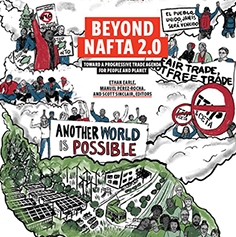As NAFTA’s negotiations begin today, Canadians are rising up to demand that their government agrees to no more corporate trade deals. The protests are particularly timely as there is speculation that in order to take steps towards a deal, Trudeau’s trade team is ready to cede to the United States Trade Representative’s proposal of an Investor-State Dispute Settlement ‘opt-in’ system. Canada has consistently favored protecting the ISDS mechanism in NAFTA and has rejected USTR Lighthizer’s proposals in the past. However, it appears that in order to continue negotiations, Canada’s team may choose to accept Lighthizer’s proposal and ‘opt-in’ to the ISDS system on their own volition.
The Toronto Star reports, “When it comes to the mechanism in chapter 11—which allows investors to sue when they feel they’ve been unfairly treated by a foreign government regulation or policy action – Ottawa says it is open to improving the chapter, to establishing standalone, professionally trained panels of trade judges to assess claims. However the Canadian sources said while Canada wants to strengthen the system, the U.S. demand that it be an ‘opt-in’ system, which would give domestic courts the power to rule if a country did not opt in, would weaken it.” The article highlights, “‘They’d expect the U.S. would opt out but Canada and Mexico would opt in’, said one official.”
The Canadian Centre for Policy Alternatives recently published a report which found that the ISDS system in NAFTA has cost over $95 million in unrecoverable legal fees, $219 million in awards and settlements, and that Canada faces eight active investor-state claims that combined seek more than $475 million in damages.
“The current renegotiation opens the door to get rid of, or at least neutralize, the investor-state dispute settlement mechanism in NAFTA and I certainly think Canada should grasp the opportunity,” said Scott Sinclair, a senior research fellow with the CCPA.
“I do think negotiators and the government are weighing their options … because the U.S. administration wants to make ISDS optional. While a lot of the Trump administration’s proposals in the NAFTA talks are harmful to Canadian interests, this one is beneficial.”
There will be many more updates on NAFTA after Round 6 culminates.

